Christian Religious Mission: The Triumph and Dilemma of Missionaries in Africa in 19th Century
Abstract
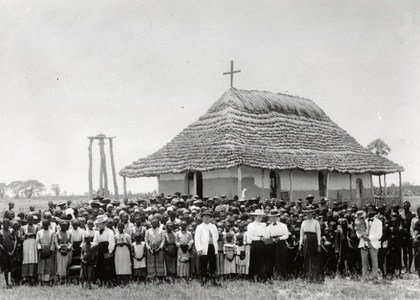
Source
This study aims to explore on role of Christian missionaries in Africa in the 19th century. The discussion on this research will focus on understanding the nature of Christian missionaries in their struggles and triumph towards Westernizing Africa. Christian missionary enterprise was no doubt of prime importance in the Westernization of Africa. Africans were, however, not passive recipients of new influences and culture patterns. The adoption of Christianity and the process of cultural exchange were shaped by African choices, needs and efforts to Africanize Africa’s Christian experience by securing the roots of Christianity in the African context. The missionaries’ goal was to convert as many souls as possible and they therefore would have settled in the most densely populated regions. The proposed study attempted to find answers how these Christian missionaries impacted the lives of the native Africans. The missionaries’ missions in Africa was a part of the white man’s burden and intrusion to help a learning a better life. Thus, findings shows how religion — Christianity — was an important factor in European transatlantic migrations and help in shaping Africa’s history in terms of political, socio-economic, religion and the cultural way of life.
Keywords: missionaries,transformation of African societies, westernization, religion
Introduction
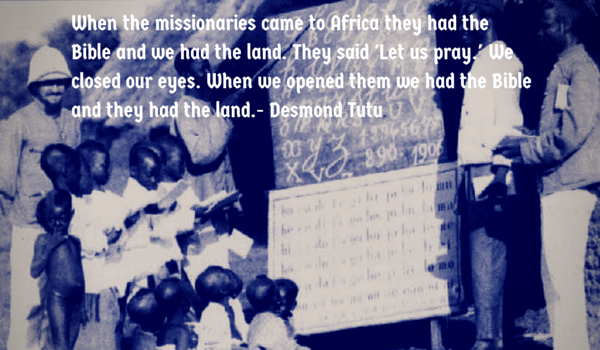
Source
The partition and exploitation of the African continent, a product of capitalist development in Europe, was formalized politically at the Berlin Conference in 1884–1885. By the end of the 19th century, the borders of African nations had been defined. As Westerners came to the “black continent” they started to promulgate and teach the natives of the Western ideals.[1]
One of the most essential changes was the arrival of a huge numbers of missionaries in the beginning of the 19th century. European missionaries to southern Africa during the nineteenth and twentieth centuries played a strangely ambiguous role in the history and affairs of the region. On the one hand they were driven by a strong desire to genuinely serve humanity and bring about material and social changes which would improve its quality of life. Many European missionaries worked extremely hard running their missions, risking their lives and good health in the process. They varied enormously in their ability to contribute to the quality of life of those they lived with. Some remained dedicated but contemptuous of those they claimed to be converting. Others developed deep affection and respect for those they worked with and made a long lasting impression.[2] The expansion of the missionary movement into Africa was part of the growing conception of Christian responsibility for the regeneration of African peoples. The anti-slavery issue and the humanitarian conscience also played a vital role in stimulating European interest in Africa and gave an impetus to mission work. It included the opening up of Africa to forces of change namely commerce (“legitimate commerce”, i.e. non-slave trade), Christianity, Civilization and Colonization. The others included the Christian responsibility for the regeneration of African peoples.[3]
Body
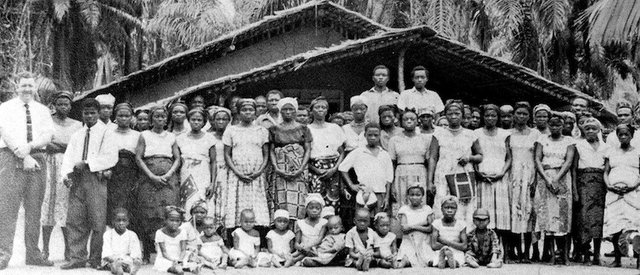
Source
Although European missionaries were successful in converting majority of the African natives to Christianity and Evangelical belief, they had faced several dilemmas in converting the natives. When missionaries came to Africa the village that they chose to settle in often welcomed them and gave them land to build their churches on. The missionaries also used their land to build clinics and schools where the African children were educated. The natives who accepted the teachings of the missionaries sent their children to the schools and tended to become educated as preachers and teachers. The missionaries emphasized teachings of never questioning authority and accepting colonial rule as ordained by God. Christianity definitely had an impact, both positive and negative, on the socio-political life of the people of sub-Saharan Africa[4]. While some missionary enterprises focused exclusively on evangelisation, missionaries such as Livingstone displayed a holistic approach to the missionary enterprise.
But as ive said, there were many challenges for the missionaries. The achievement of the purpose of these Christian Missions came with some costs. Several missionaries died at a youthful age due to the unfriendly tropical climate. Again, in West-Africa, the efforts to go beyond the coast to reach those inland with the gospel coincided with the southwards expansion of Islam which posed some threat to the expansion of the work of Christian evangelizing missions[5]. The work of the missionaries also had little success initially. The people received the message with indifference. It was however in the coastal territories filled with mulattos and other European trading communities that Christianity won some of its early success. The early European Christian missionaries in West Africa experienced a number of difficulties, some arising from factors outside their control and others of their own making. To name some here are the most challenging for them. Accordingly, Unsuitable Climatic Conditions was one of the biggest adjustment. The tropical climatic condition in the country was not favourable to the early missionaries who came to the shores of West Africa. The high temperatures coupled with high rainfall patterns in some parts of the country experienced during the daytime, made the missionaries stay indoors, which slowed down their activities.
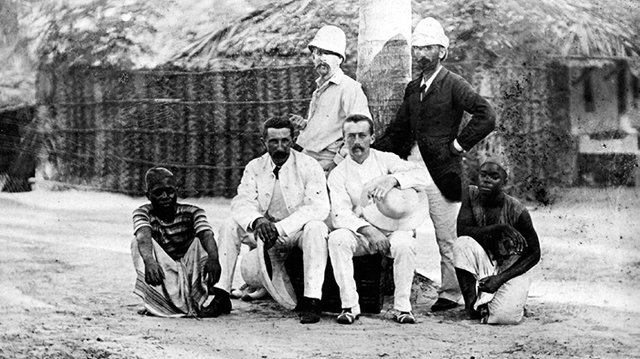
Source
Second are language barrier difficulties. They faced the problems of the many languages and dialects and their ignorance of the true meaning of the various cultures, beliefs, values and ways of life of the people whom they set out to convert to Christianity.[6] For the West Africans, the acceptance of Christianity meant the total rejection of most of the cherished institutions upon which their society rested. They had to speak through few interpreters who did not have sufficient education to interpret correctly. In such situations, the message sometimes appealed to the local people depending on the efficiency of the interpreter.
Moreover, speaking through interpreters is a defective means of communicating one’s thoughts to one’s audience. Third is the despised African culture, early African converts to Christianity, were made to abandon their ancestral culture and way of life as ‘pagan’ therefore to be shunned. Indeed, in some situations the converts were taught to feel that they were absolved from obeying their own traditional rulers and certain laws of the state. These trends occasionally brought kings into conflict with the missionaries and their converts. Fourth Misconception by the early Europeans, one very evident problems created by the white missionaries themselves arose largely from a misconception of what Africa represented. Europe in those days looked upon Africa as ‘the Dark Continent’ with very primitive civilizations, and most Europeans refused to adapt their religion to suit the local situation. And yet this was what earlier missionaries in pagan Europe had done when, for example, they had changed the Sabbath to suit the pagan Sun Day (hence Sunday), and had also adopted the dates of the pagan festivals to celebrate Christmas Day and the Easter festival.
Source
Another blowout was the health and financial problems, almost all the missions in West Africa faced financial problems in the early stages of their missionary work. They relied very much on their home churches for their funds. But the funds and other needed materials even when available could not reach their station in time. This was because all the ships that came to the coast at that time were owned by trading firms and companies whose interest were basically on trade[7]. In such a situation, provisions and other things had to be sent into the country not in large quantities as would have been desired by the missionaries. In addition, the tropical climate and health Hazards was a headache for the health of missionaries. Many missionaries died because of the climate and tropical disease. This single problem made the missionary work very difficult. However, the discovery of quinine and other curative medicines in the late 19th century made the history of the missionary work in West Africa a different thing altogether. Lastly, insufficient Christian Literature Another difficulty that the early missionaries faced in the spread of Christianity was insufficient Christian literature at that time. There were no Bibles in local languages, likewise grammar books were scant, so the missionaries had to spend time learning local languages, and translated the Bible and wrote series of grammar books. It is obvious, from the foregoing, therefore, that changes to the indigenous built environment did not rank high on the list of missionary priorities. Yet, despite their preoccupation with "heathen" social practices, their concerns for local architecture were never hidden too far below the surface.[8]
Conclusion
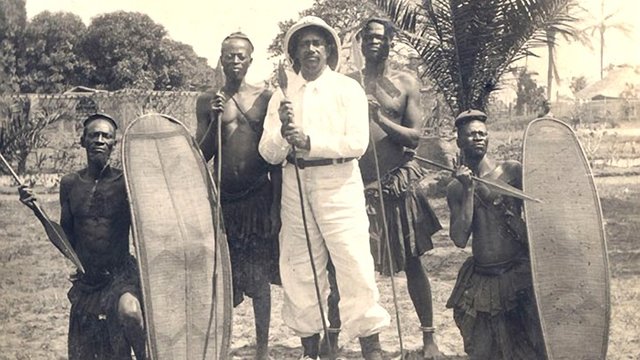
Source
The legacy of these religious missionaries lives up to this day. Missionary movements have had an immense effect on changing patterns of Christian adherence across the globe and more generally on the making of world history. Mission work created close encounters of peoples from a great diversity of ethnic and racial backgrounds, well ahead of the globalisation and multiculturalism of the later twentieth century. For Africa the missionary movement represented the first and most important facet of Western contact[9]. Christianity provided access to a civilization and culture pattern which was bound to conquer African societies. The adoption of Christianity also meant acculturation into the world of Western civilization, ideas and technology, with Christianity went also Westernization. The dramatic expansion of Christianity in twentieth century Africa which has been called “the fourth great age of Christian expansion”, has shifted the core of Christianity from Europe and North America to Africa, Latin America and certain parts of Asia. Thus, the impingement of Western cultural norms, lifestyles and beliefs rudely shattered African societies. However, Africans were not passive recipients. The process of Westernization and cultural exchange was shaped by their choices and needs.[10]
Sources
Books
1.Ajayi, J..F.A and Michael Crowder (1974)History of West Africa. Vol. 2 Longman Group Ltd. London
- 2. Babalola, E. O.(1976) Christianity in West Africa. Bamgboye & Company Press.
- Ebrunner, Hans Werner (1967). A history of Christianity in Ghana. Waterville Pub. House, .
- Porter, Andrew.(20020 “Church history, history of Christianity, religious history: some reflections on British missionary enterprise since the late eighteenth century.” Church History 71, no. 3
- Shaw, M.(1996) The kingdom of God in Africa: A short history of African Christianity. Baker Pub Group.
- Sundkler, Bengt - STEED, Christopher.(2003) A History of the Church in Africa, op.
Internet Sources
- Davidson, B.(1965) THE GROWTH OF AFRICAN CIVILISATION: A History of West Africa 1000-1 800. Accessed on November 09, 2018 from http://africa.unc.edu/outreach/timbuktu/davidson.pdf
- Engel, E.(2017) The (African) American Missionary Movement in Africa in the Early Twentieth Century.Accessed on November 08, 2018 from http://www.processhistory.org/engel-american-missionaries/
- Strayer, R.(1976) Mission History in Africa: New Perspectives on an Encounter. Acccessed on November 08, 2018 from http://www.joaoferreiradias.net/wp-content/uploads/2012/02/Mission-History-in-Africa-New-Perspectives-on-an-Encounter.pdf
- Vilhanova, V.(2011)The Role of Early “Missionaries of Africa or ‘White Fathers’ in the Study and Development of African Language.Accessed on November 04, 2018 from https://www.sav.sk/journals/uploads/091911545_Vilhanova.pdf
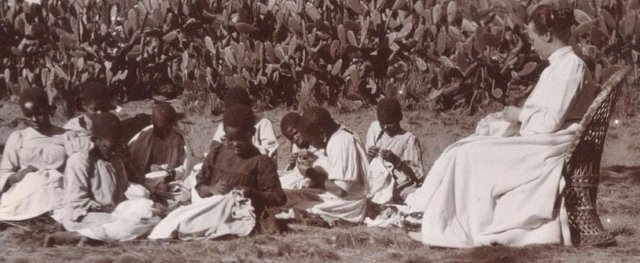
Congratulations @zam398! You have completed the following achievement on the Steem blockchain and have been rewarded with new badge(s) :
Click here to view your Board of Honor
If you no longer want to receive notifications, reply to this comment with the word
STOPDo not miss the last post from @steemitboard:
Congratulations @zam398! You have completed the following achievement on the Steem blockchain and have been rewarded with new badge(s) :
Click here to view your Board
If you no longer want to receive notifications, reply to this comment with the word
STOPCongratulations @zam398! You received a personal award!
You can view your badges on your Steem Board and compare to others on the Steem Ranking
Do not miss the last post from @steemitboard:
Vote for @Steemitboard as a witness to get one more award and increased upvotes!
Congratulations @zam398! You received a personal award!
You can view your badges on your Steem Board and compare to others on the Steem Ranking
Do not miss the last post from @steemitboard:
Vote for @Steemitboard as a witness to get one more award and increased upvotes!